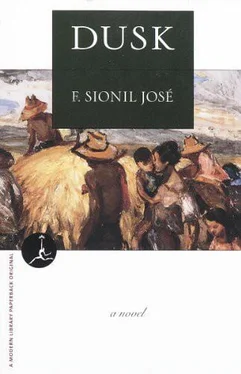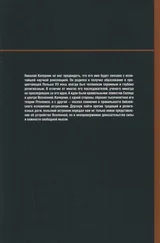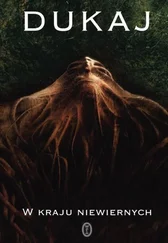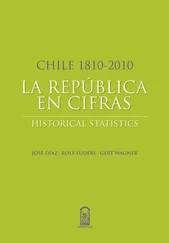“White like all Kastilas,” the man said. “He has short hair.”
There flashed in his mind the image of Capitán Gualberto.
“The Guardia are searching all the caravans from the north. There is a one-armed man from Cabugaw they are looking for. They have been beating up people, particularly those who come from Sur, to get information from them — even if they are not from Cabugaw. But they did not bother us — he knows how to deal with them.” The man thrust a chin to the older horse merchant, obviously his employer, busy turning the dried meat roasting on the coals.
“There is no one-armed man here, as you can see,” Istak said.
“Even so,” the man said. “You are from Cabugaw, aren’t you? If I were you, I would put as much distance as I could from them immediately …”
Dalin had heard everything.
The other man spoke softly. “Yes — after you cat, you should leave. You never know what they will do. I hope all your papers are with you.”
Dalin turned to Istak. She did not speak; her eyes told him of her fear. He turned around to the morning activity, children playing in the sun, wives preparing breakfast, and men checking on the work animals, giving them their ration of hay.
Their visitors would ride all the way to Tarlak, and from there, they would put the beautiful animals on the train to Manila. Finished with their breakfast, they mounted and were on their way.
Istak did not want to distress the others. He let them brew their coffee and roast the dried python meat on the open fire.
It was best that only he and Dalin know that the Guardia were closing in on them again. They must leave now. Already the Caraballo range loomed ahead. A few more miles and they would cross the Agno, and from then on, the promise of eastern Pangasinan.
Now, they struck out onto trails even Dalin did not know. A pelting rain by midafternoon hid almost everything from view, but they moved on, the water seeping through the walls of the carts. The wheels soggy with mud, they sloshed through villages enveloped with rain and as evening finally shrouded the land, still they moved on. By now, the uncles from Candon understood only too well why they must not pause. For supper, they ate cold chunks of rice and the dried python that was roasted in the morning; the cold rice stuck to their throats and had to be washed down with water.
The men who went ahead of the caravan were wet and they shivered but they, too, marched on, stopping only once in a while to ask from an isolated farmhouse the general direction of the ferry which they would have to board to cross the Agno. Shortly before daybreak, the rain finally lifted and the east was bathed with the mellow light of a new day.
They were back on the old road, muddy and impassable in many places. They had to detour through fields and indentations that were made firm by banana trunks laid over them. An-no, who was ahead of the caravan, rushed back to them eagerly shouting: “The river, the river — it is ahead.”
It was finally before them — the life-giving artery whose delta was so fertile and wide it could swallow all the settlers with nowhere to go. They could not settle permanently in any place, however, for anytime during the year when the rains came, the waters changed course and laced the delta with rivulets, rising no higher than a woman’s ankle.
They stopped at the river’s bank. Indeed, exactly as Dalin had described it, the river was wide and swift. In the middle and close to the bank were whirlpools. The current carried trunks and branches of trees from the mountains and islands of water lilies.
They should make their crossing immediately. At the landing below, people were gathered. But there was no ferry, no raft, and there was none on the other side either.
It started to drizzle again, and in a while the drizzle turned into sheets of lashing rain. Under the canopies, almost everything inside the carts was dry. Out where he sat holding the reins, Istak was thoroughly drenched. The palm leaf helmet and cape were no protection. But just as quickly as the rain started it petered out.
Istak went down the incline to where people were gathered, farmers with goats and chickens which they wanted to transport to the other side, and women carrying baskets filled with greens.
“How do we cross?” Istak asked no one in particular. A farmer turned to him and shook his head.
“You could swim,” he said lightly.
When Istak did not speak, the farmer went on. “The ferry — it broke from its mooring in the night when the water rose. It must be far downstream now with the ferryman, who perhaps had fallen asleep.”
“Is there no other ferry?” Istak was anxious.
The other farmers who were listening shook their heads. No other ferry but this one. Maybe, if you go downriver to Alcala — but that is very far from here. And in Bayambang, there is a ferry there because they are building a bridge.
“And upriver?”
Again, a collective shaking of heads.
“There must be a shallow place where we can cross.”
“Yes, there is,” a farmer said, pointing to the line of carts up the incline of the bank. “But it will be dangerous.”
There was no time to think. As leader, he must now decide. “We are in a hurry,” he said. “God will take care.”
During the dry season, when the river was shallow, the ferrymen had built a roadway along which carts and people could pass. Where the river was shallowest, they piled the stones; they stretched across the shallow water several coconut trunks on top of which they spread cogon grass, then a layer of gravel. They did not use the ferry anymore. With this bridge, they charged a cheaper rate.
“The bridge is there.” The man pointed it out to him. “You can cross but don’t stray from the embankment because it will be deep now on both sides. And as for the coconut bridge, you must go ahead of the carts and feel for it with your feet. It should still be there.”
The carts came down the gully. The men had dismounted and were holding the animals by their reins so that they would not go down too fast.
An-no took the lead carabao . The road to the small bridge had not been washed away by the rain, though the water had risen. The stone embankment still showed through the brown water.
The uncles from Tagudin were reluctant to cross. Blas suggested that they could very well settle in this wide and fertile plain — surely there were still forests they could clear, where they would not be hounded.
“It is a distance we need,” Istak said, “distance from those chasing us. They will ask people and so many have seen us — they will know where to find us. The farther we go, the more difficult it will be for them to follow. And after we cross the river, no one would really know where we headed.”
And because he was learned, they finally agreed.
The bridge had to be tested first, and Bit-tik, who was a good swimmer, went ahead, following the embankment. It was still secure, as the men at the riverbank had assured them. He moved slowly in the brown moving waters which never got higher than his waist, feeling with his feet the boulders that had remained. The carts could go over them. Then the line of boulders ended and he was on the bridge itself. The coconut trunks had not been dislodged — they were intact all the way, but the current had become swift and Bit-tik had difficulty steadying himself.
Once across, on the embankment again, he turned to the waiting carts across the expanse of water and shouted: “The bridge is still here. You can cross.”
The carabaos were used to water; every day during the journey, they had to look for some stream or well so that the animals could be bathed. The bull might be scared, but Dalin was sure it would be all right; she led it steadily into the line. Istak went onward to the middle of the river, and realized that he was not yet all that strong and could be swept away by the current.
Читать дальше












